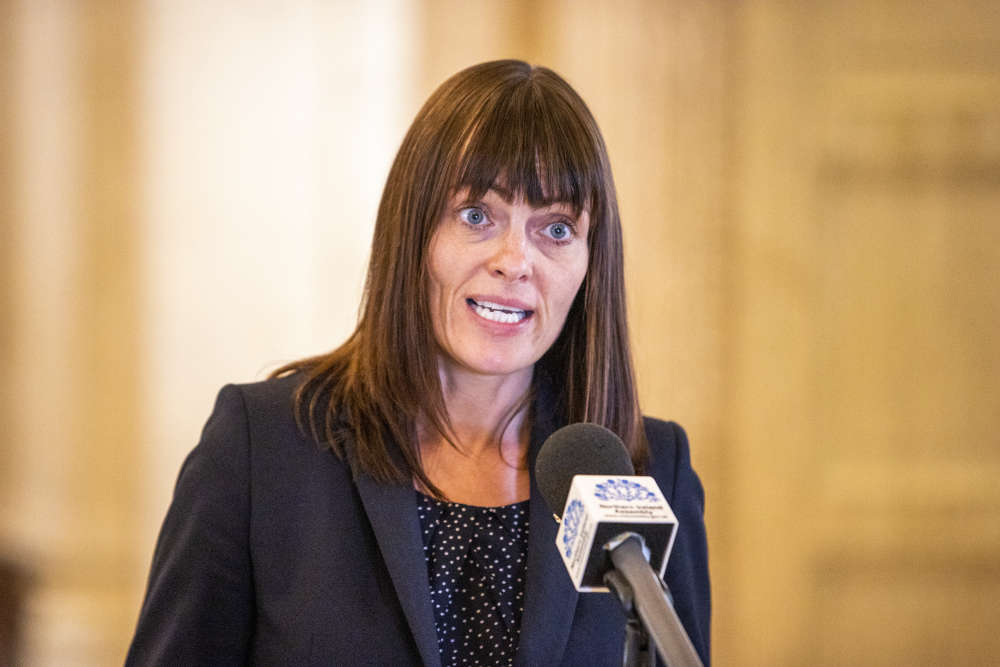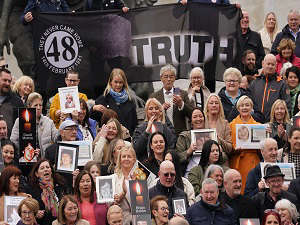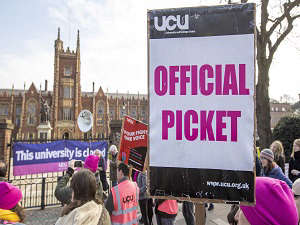
By David Young, PA
A court challenge against two Stormont ministers over a failed legal action against the police is an attempt to score political points, a judge has been told.
A barrister for Infrastructure Minister Nichola Mallon and Communities Minister Deirdre Hargey said the court should be careful not to be used in a “game of political football”.
Today, Mr Justice Scoffield reserved a ruling on whether to grant leave for a judicial challenge over the ministers’ ill-fated legal action last summer.
In July, the ministers launched proceedings against the Police Service of Northern Ireland (PSNI), challenging its decision not to intervene to assist in the removal of a contentious Eleventh Night bonfire in the loyalist Tiger’s Bay area of north Belfast.
The case was rejected by a High Court judge in a late-night emergency hearing days before the bonfire was due to be lit.
Loyalist activist Jamie Bryson, who represented the bonfire builders in last year’s dispute, is pursuing judicial review proceedings against the two ministers, contending they should have secured the approval of the wider Stormont Executive before taking legal action against the PSNI.
Mr Justice Scoffield heard legal arguments during a leave hearing in Belfast High Court this morning.
He said he would issue a ruling tomorrow morning on whether the case can proceed to a full judicial review hearing.
Under Stormont rules, issues deemed “significant and controversial” should be dealt with by the power-sharing Executive as a whole.
Issues that cut across the responsibilities of multiple departments should also be brought to the Executive under the terms of the ministerial code.
Mr Bryson argues that taking the PSNI to court over the bonfire was significant, controversial and cross-cutting and that the ministers were therefore acting unlawfully by proceeding without first securing the approval of other ministerial colleagues.
He has asked the court to prohibit the ministers taking such action in the future without Executive approval and also issue a declaration clarifying the legal position.
Barrister Neasa Murnaghan QC, representing the ministers, acknowledged there is an arguable case in respect of the bonfire dispute being significant and controversial.
However, she rejected the claim that it is cross-cutting and argued that the ministers had acted together in the PSNI legal challenge to save public money.
Moreover, she said the basis of Mr Bryson’s challenge is “academic” and “entirely moot” because the events of last July are over and the ministers had ultimately failed in their legal action.
She said the ministers’ move against the police related to a specific factual matrix that was highly pressurised and time-sensitive.
As such, the barrister said the same situation is unlikely to recur and questioned what public interest there would be in airing the issues in court.
“A cynical person, of course, might consider that there is a political agenda behind this,” she said.
Ms Murnaghan questioned whether the arguments advanced by Mr Bryson are “masking the scoring of political points”.
“I think the court should be very careful not to permit itself to be used in a game of political football,” she added.
The barrister noted that Mr Bryson had expressed concern at a perceived waste of public funds in the ministers taking the action last summer.
She said it would be “ironic” if he was then able to pursue a judicial review, at further cost to the public purse, on a “completely academic matter”.
Mr Bryson’s case was argued by John Larkin QC, Northern Ireland’s former attorney general.
He said the case involves important issues relating to Northern Ireland’s governing constitution.
The barrister said it is “imperative that ministers are aware of the limits of the constitution”.
“Mr Bryson seeks prohibition, it certainly isn’t academic, and he seeks a declaration as to an important point of construction of our constitution – can ministers make these kind of joint solo runs or must they bring them to the Executive?
“We say they must bring them to the Executive, and we say that it’s clearly arguable that the ministers have clearly breached the obligations that our constitution imposes on them.”
Mr Larkin dismissed the suggestion that the points raised are academic.
He said disputes over bonfires are a “recurring” issue every year in Northern Ireland.
“The reality is the dispute between Mr Bryson and these ministers is live, it’s not academic,” he said.
“It’s live in the here and now.”
The ministers took legal action in July when police declined to offer protection to contractors hired by Belfast City Council to remove the Tiger’s Bay bonfire, which was built in proximity to a community interface with the nationalist New Lodge, citing concerns that their intervention could lead to disorder.
When the case was rejected, contractors were unable to remove the bonfire without PSNI protection and the pyre was lit as planned days later.
Ms Mallon and Ms Hargey took the emergency legal action after citing concerns raised by nationalist residents that they were living in fear and had been attacked with missiles thrown by loyalist bonfire builders.
Loyalists rejected suggestions that the siting of the bonfire was deliberately provocative and accused nationalists of whipping up tensions in an effort to deny them what they regard as a legitimate celebration of their culture.

Infrastructure Minister Nichola Mallon


 Calls for State apology for Stardust families after unlawful killing verdicts
Calls for State apology for Stardust families after unlawful killing verdicts
 Lecturers to end industrial action after accepting pay offer
Lecturers to end industrial action after accepting pay offer
 Range of views on proposed smoking ban – Little-Pengelly
Range of views on proposed smoking ban – Little-Pengelly
 Opera director to use £5,000 award for projects to help vulnerable and homeless
Opera director to use £5,000 award for projects to help vulnerable and homeless
 Ministers pledge to work together on baby loss certificate scheme
Ministers pledge to work together on baby loss certificate scheme